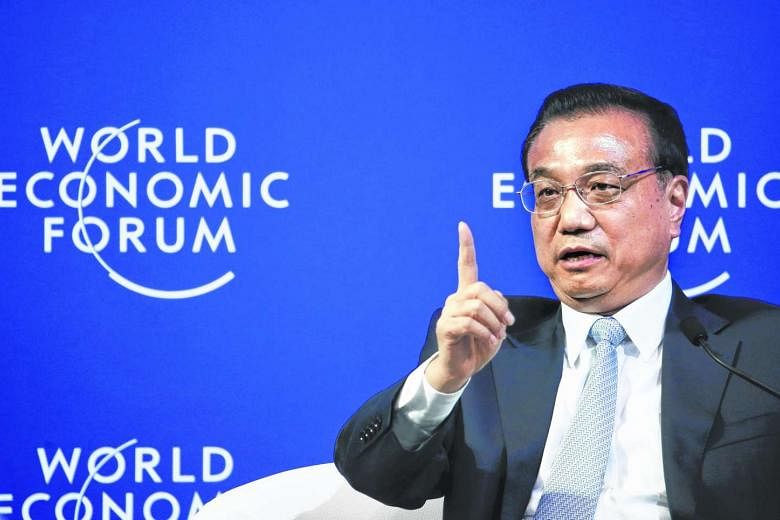DALIAN, CHINA (BLOOMBERG, REUTERS) - China's economy faces challenges and downward pressures but there is no risk of a hard landing as the government is fully capable of supporting growth, Premier Li Keqiang said on Thursday (Sept 10).
Mr Li told the World Economic Forum in Dalian in northeastern China that he was confident that the government would achieve its main economic targets this year. China has set its annual target for growth in gross domestic product (GDP) at about seven per cent for this year, down from last year's objective of around 7.5 per cent. He said China will take steps to expand domestic demand and will implement policies to boost imports.
If the economy were to "show signs of slipping out of the reasonable range, we have sufficient capability to respond," Mr Li said Thursday (Sept 10) in a keynote address at the forum.
"China will not see a hard landing," he said, seeking to seeking to buttress global confidence in his nation's slowing economy after a stock market rout and surprise currency devaluation last month triggered a worldwide sell off in commodities, equities and emerging market currencies.
The premier also said that China will never start a currency war and countries should instead boost economic cooperation as the global economy remains sluggish.
Saying that countries should not rely on quantitative easing to deal with global economic problems, he reiterated that China would keep the yuan "basically stable at a reasonable and balanced level".
Beijing is still struggling to stabilise the yuan after its surprise devaluation of the currency on Aug 11 which saw the country's share indexes plunge 40 per cent since mid-June.
Downward pressure on the economy has also increased, with exports falling 5.5 per cent in August from a year earlier and the nation's official factory gauge falling to a three-year low. Data on Thursday underscored the challenge facing policymakers, as factory-gate deflation deepened in August while consumer price gains increased.
Mr Li likened managing slowing growth to a "Chinese chess game," balancing short-term stimulus moves against longer-term efforts to reform and open up the world's second-largest economy.
"We have plenty of tools at our disposal," he said. "You need to be careful with immediate moves you take. That is to say, we need to take targeted measures to resist downward pressure on the economy at the same time we need to build momentum for sustainable and healthy economic growth."
His remarks echo People's Bank of China Governor Zhou Xiaochuan, who said over the weekend that the rout in Chinese stocks is close to ending and that state intervention stopped a free-fall.
"He's trying to strike a more upbeat note, telling the world that China remains a reassuring force for the international economy, and all countries will benefit from China's economic reforms eventually," said Wang Yukai, a governance professor at the Beijing-based Chinese Academy of Governance. "The premier's speech is a response from China's central leadership to ease the growing doubts across the world over the the country's future development and the wisdom of the government's economic plans."
Mr Li said policy makers have eschewed strong fiscal and monetary stimulus so far, and will not slow the pace of structural reform as they shifts the economy's reliance from manufacturing and exports to services and consumption. Services now account for about half of China's gross domestic product and consumption about 60 per cent of growth, he said.
"We will not be swayed by short-term fluctuations in the economy but we will not take it lightly either," Li said. "We are taking necessary measures of targeted, discrete and precise macro controls" to mitigate volatility and prevent spillovers.
Li said steadily opening the financial sector has been one of the nation's goals, and reiterated comments he made Wednesday that China will seek to keep the exchange rate at a reasonable and balanced level. In the latest step toward opening the capital account, China will allow foreign central banks to directly enter the interbank currency market, Li announced in the speech.
"China policy makers want to make it clear to foreign investors and politicians that it is still opening, its reform is still on track," said Larry Hu, head of China economics at Macquarie Securities in Hong Kong. "After the RMB devaluation, the world thinks that China will start a currency war. China policy makers want to confirm that they don't want that."

